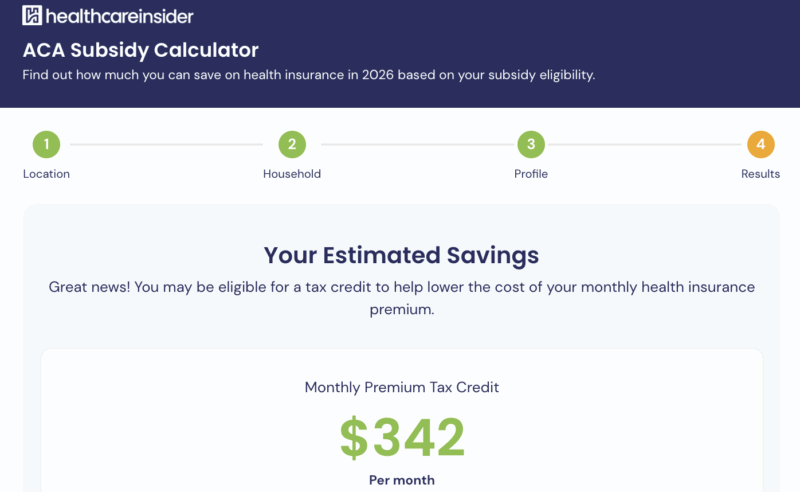Written by Michael LaPick
Healthcare Writer
We want to help you make educated healthcare decisions. While this post may have links to lead generation forms, this won’t influence our writing. We adhere to strict editorial standards to provide the most accurate and unbiased information.
Key Takeaways
- Leading carriers for 2025–2026 include Blue Cross Blue Shield, UnitedHealthcare, Aetna, Cigna, Ambetter, and Oscar.
- ACA Marketplace plans provide full medical coverage and essential health benefits for individuals and families.
- All ACA plans must cover pre-existing conditions and preventive care without added cost.
- Premium subsidies and cost-sharing reductions can significantly lower monthly costs.
- If you’re not subsidy-eligible, alternative options may still provide budget-friendly coverage.
Overview
Choosing the best health insurance plans for individuals can feel overwhelming—especially when you’re evaluating multiple ACA Marketplace carriers, comparing premiums, and determining subsidy eligibility. Whether you’re self-employed, purchasing coverage outside an employer, or securing a plan for your family, the ACA Marketplace remains the most dependable path to comprehensive benefits and predictable annual costs.
This expert guide provides an in-depth overview of the best health insurance plans for individuals in 2026, including top ACA carriers, plan tiers, cost structures, federal subsidies, and alternative coverage options.
Best Health Insurance Plans for Individuals in 2026
The insurers below consistently offer some of the best health insurance plans for individuals, combining strong provider networks, competitive pricing, digital tools, and high overall value. Availability varies by state.
Blue Cross Blue Shield (BCBS) — Best for Nationwide Flexibility
Operating through 36 regional companies, BCBS offers ACA-compliant coverage across all 50 states, Washington, D.C., and Puerto Rico. BCBS is recognized for offering some of the best health insurance plans for individuals who want broad provider access and reliable nationwide coverage.
Explore more in our most recent Blue Cross Blue Shield review.
Anthem — Best for Customizable Benefits
As a major BCBS affiliate, Anthem offers ACA plans that emphasize preventive care, mental health services, and optional dental and vision add-ons. Its customizable plan options make Anthem a strong choice for individuals with varied health needs.
Explore more in our most recent Anthem review.
UnitedHealthcare (UHC) — Best Provider Networks
UHC’s ACA Marketplace plans are known for expansive provider networks, integrated care programs, and digital management tools. For individuals who want maximum choice of physicians and convenient virtual care, UHC delivers excellent value.
Explore more in our most recent UnitedHealthcare review.
Cigna Healthcare — Best for Digital-First Care
Cigna offers modern, digital-first Marketplace plans with robust telehealth, care coordination features, and strong customer support. It remains one of the best health insurance plans for individuals who prefer streamlined digital access.
Explore more in our most recent Cigna review.
Ambetter Health (Centene) — Best for Affordability
Ambetter offers competitively priced ACA plans in 29 states, along with wellness rewards and chronic-care management. It’s a popular option for individuals and families seeking high value at lower premiums.
Explore more in our most recent Ambetter review.
Oscar Health — Best Technology Experience
Oscar’s virtual-first ACA model emphasizes telemedicine, app-based care, and simplified cost transparency. It is especially appealing to younger adults and digital-first consumers.
Explore more in our most recent Oscar Health review.
What ACA Plans for Individuals Must Cover
All ACA-compliant plans must cover 10 essential health benefits, including:
-
Emergency and outpatient care
-
Hospitalization
-
Prescription drugs
-
Mental health and substance-use treatment
-
Maternity and newborn care
-
Preventive and wellness services
-
Lab services
-
Rehabilitative/habilitative services
-
Pediatric benefits (including vision and dental)
-
Chronic condition management
Additionally, ACA plans guarantee:
-
Free preventive care
-
No lifetime or annual benefit limits
-
Annual out-of-pocket maximum protections
These federal standards ensure consistent quality across Marketplace plans.
A friendly team of licensed insurance agents is here to guide you.
Costs of the Best Health Insurance Plans for Individuals
Evaluating the best health insurance plans for individuals requires understanding the major cost components of ACA Marketplace coverage.
Key Cost Elements
-
Premium: Monthly payment to maintain coverage
-
Deductible: Amount paid before insurance begins sharing costs
-
Copay: Fixed fee for specific services
-
Coinsurance: Percentage of costs paid after the deductible
-
Out-of-Pocket Maximum: Annual cap on total spending
ACA Subsidies
Subsidies for ACA plans, known as premium tax credits, help reduce monthly health insurance costs for people who buy coverage through the federal or state marketplace.
To qualify in 2026, household income must fall between 100% and 400% of the Federal Poverty Level (FPL)—earning too little could make you eligible for Medicaid, while earning too much can phase out eligibility.
Next Step: Check your eligibility using an online ACA subsidy calculator to estimate your potential premium savings and see if switching plans could help lower your costs.
Even if your income falls outside this range, it’s worth monitoring changes to subsidy rules, since federal policies are scheduled to adjust in the coming year. You can learn more about how these changes might affect your premiums in our latest article on losing ACA subsidies in 2026.
ACA Metal Tiers: Comparing the Best Health Insurance Plans for Individuals
ACA Marketplace plans are categorized into four metal tiers, helping individuals balance monthly premiums with out-of-pocket costs.
| Plan Tier | Typical Monthly Premium | Cost Sharing | Best For |
|---|---|---|---|
| Bronze | ~$410 | 60% insurer / 40% you | Healthy individuals seeking the lowest premiums |
| Silver | ~$550 | 70% insurer / 30% you | Most individuals, including those eligible for subsidies |
| Gold | ~$640 | 80% insurer / 20% you | Frequent healthcare users |
| Platinum | Varies | 90% insurer / 10% you | Individuals wanting maximum coverage and minimal out-of-pocket costs |
Tip: Silver-tier plans remain the most popular because they qualify for both premium subsidies.
According to the Kaiser Family Foundation (KFF), the average benchmark Silver plan for a 40-year-old in 2025 costs about $497 per month before subsidies. These averages reflect unsubsidized premiums; actual payments may be much lower for those who qualify for premium tax credits.
Alternatives to ACA Marketplace Plans
If you and your family are not eligible for subsidies, ACA alternative options such as short-term medical coverage, fixed-benefit plans, supplemental insurance, faith-based programs, and bundled dental or vision plans may provide flexible and affordable protection tailored to your needs.
Short-Term Medical Insurance
Short-term health insurance can serve as a temporary bridge for those between jobs, recent graduates, or individuals who age off a parent’s plan. These policies provide fast enrollment, coverage starting the next day, and access to national provider networks—often at a lower cost than long-term ACA coverage.
Key Benefits:
- Preventive and wellness care on all plans
- Copays for doctor or urgent care visits
- Free telemedicine access
- Prescription drug discounts
- Fast online enrollment (in under 5 minutes)
Supplemental Insurance
Supplemental plans (accident, critical illness, hospital indemnity) provide cash benefits to help offset high deductibles or unexpected medical bills.
Dental and Vision Insurance
Standalone dental and vision plans can be paired with Marketplace coverage and are often cost-effective for individuals seeking routine or specialized care.
Health Care Sharing Ministries
Faith-based sharing programs lower monthly costs by pooling member contributions. These programs are not traditional insurance but can serve as an alternative option.
Fixed-Benefit Medical Plans
Fixed-benefit plans pay a set dollar amount per service, helping individuals manage predictable healthcare expenses without deductibles.
FAQ: Best Health Insurance Plans for Individuals
What are the best health insurance plans for individuals in 2026?
The strongest plans typically come from major ACA insurers such as BCBS, Anthem, UnitedHealthcare, Cigna, Ambetter, and Oscar, depending on your state.
How can individuals compare health insurance plans effectively?
Consider premiums, deductibles, provider networks, drug coverage, and subsidy eligibility.
Are ACA Marketplace plans the best option for most individuals?
Yes. Because they include regulated benefits, cost protections, and subsidy access, ACA plans are widely regarded as the best health insurance plans for individuals.
Can private plans be cheaper than ACA coverage?
Sometimes, but private plans may not include essential health benefits or out-of-pocket caps.
Bottom Line: Choosing the Best Health Insurance Plans for Individuals in 2026
For most consumers, the ACA Marketplace continues to offer the best health insurance plans for individuals in 2026. These plans provide comprehensive benefits, strong financial protections, and access to many of the nation’s top insurers. Subsidy-eligible shoppers can often secure high-quality coverage at a substantially reduced cost.
For those who don’t qualify for subsidies, alternatives like short-term plans, dental and vision coverage, or supplemental products may help fill coverage gaps or enhance existing benefits.
Carefully evaluating premium costs, provider networks, and coverage tiers will help you select a plan that offers both affordability and long-term financial protection.
Thank you for your feedback!








